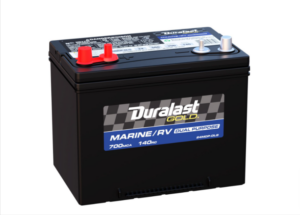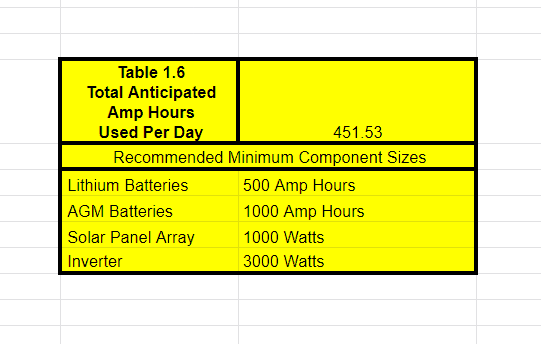Camper Battery
When venturing into the great outdoors, a reliable camper battery is essential to power the comforts of home on the go. Whether you're a seasoned RV enthusiast or a casual weekend warrior, a high-quality battery can make all the difference in keeping your lights, appliances, and devices running smoothly. With so many options available on the market, choosing the right camper battery can be a daunting task. In this article, we'll delve into the world of camper batteries, exploring the key factors to consider, top picks, and expert tips to ensure your next adventure is powered to perfection.
Understanding Camper Battery: Powering Your Off-Grid Adventures
When it comes to camping, having a reliable power source is essential to keep your appliances and gadgets running. A camper battery is a critical component of your off-grid setup, providing the energy you need to stay connected and comfortable while exploring the great outdoors.
Types of Camper Batteries
There are several types of camper batteries available, each with its own strengths and weaknesses. The most common types include:
Deep Cycle Batteries: Designed for deep discharge and recharge cycles, these batteries are ideal for camping applications.
Starting Batteries: Used for starting engines, these batteries provide a high burst of power but are not suitable for deep cycle applications.
AGM (Absorbed Glass Mat) Batteries: A type of deep cycle battery that uses a special glass mat to absorb the electrolyte, making them more durable and maintenance-free.
Lithium-Ion Batteries: Lightweight and compact, these batteries offer high energy density and long cycle life, but are more expensive than traditional batteries.
| Battery Type | Specs | Pros | Cons |
|---|---|---|---|
| Deep Cycle | 12V, 200Ah | Long cycle life, low maintenance | Heavier, more expensive |
| Starting | 12V, 500CCA | High burst power, low cost | Not suitable for deep cycle use |
| AGM | 12V, 220Ah | Durable, maintenance-free | More expensive than traditional batteries |
| Lithium-Ion | 12V, 300Ah | Lightweight, high energy density | Expensive, limited cycle life |
Camper Battery Capacity and Sizing
When selecting a camper battery, it's essential to consider the capacity and sizing requirements for your specific needs. The capacity of a battery is measured in Ampere-hours (Ah), and the sizing depends on the appliances and gadgets you plan to power.
Small Systems: For small camping setups, a 100-200Ah battery may be sufficient.
Medium Systems: For medium-sized systems, a 200-400Ah battery is recommended.
Large Systems: For larger systems, a 400-600Ah battery or more may be required.
Charging and Maintenance
Proper charging and maintenance are crucial to extend the life of your camper battery.
Charging Methods: Use a high-quality charger specifically designed for deep cycle batteries.
Monitoring: Keep an eye on the battery's state of charge and voltage levels.
Maintenance: Perform regular checks and maintenance tasks, such as cleaning the terminals and checking the electrolyte levels.
Camper Battery Safety Precautions
When handling and installing camper batteries, it's essential to take safety precautions to avoid accidents and damage.
Handling: Wear protective gear, such as gloves and safety glasses, when handling batteries.
Installation: Ensure proper installation and secure the battery to prevent movement.
Ventilation: Provide adequate ventilation to prevent the buildup of hydrogen gas.
Camper Battery Accessories and Upgrades
To get the most out of your camper battery, consider investing in accessories and upgrades that can enhance performance and functionality.
Battery Monitors: Provide real-time monitoring of the battery's state of charge and voltage levels.
Solar Panels: Add a sustainable charging source to your camper battery.
Inverters: Convert DC power to AC power for running appliances and gadgets.
What kind of battery does a camper use?

A camper typically uses a deep cycle battery, which is designed to provide a steady flow of energy over a long period of time. These batteries are different from the ones used in cars, which are designed to provide a high burst of energy to start the engine.
Types of Batteries Used in Campers
There are several types of batteries that can be used in campers, including:
- Flooded Lead-Acid Batteries: These are the most common type of deep cycle battery used in campers. They are affordable and widely available, but they require regular maintenance to ensure they last a long time.
- AGM (Absorbed Glass Mat) Batteries: These batteries use a special type of separator to keep the acid and plates separate, making them more durable and maintenance-free compared to flooded lead-acid batteries.
- Lithium-Ion Batteries: These batteries are becoming increasingly popular in campers due to their high energy density, long cycle life, and low self-discharge rate. However, they are more expensive than traditional deep cycle batteries.
Battery Capacity and Size
The capacity and size of the battery used in a camper depend on several factors, including the type and number of appliances, the length of stay, and the availability of charging sources. A larger battery provides more power and longer runtime, but it also takes up more space and weighs more.
Charging and Maintenance
Proper charging and maintenance are crucial to extend the life of a camper's battery. This includes:
- Regular Charging: The battery should be charged regularly to prevent sulfation and ensure it remains in good condition.
- Monitoring State of Charge: The state of charge should be monitored regularly to prevent overcharging or undercharging.
- Cleaning and Inspection: The battery terminals and connections should be cleaned and inspected regularly to prevent corrosion and ensure good contact.
Additional Power Sources
In addition to the battery, campers often have additional power sources, including:
- Solar Panels: These provide a renewable source of energy and can be used to charge the battery during the day.
- Generators: These provide a backup source of power in case the battery runs out or when additional power is needed.
- Shore Power: This provides a connection to an external power source, such as a campsite's electrical hookup.
Upgrading and Replacing Batteries
When upgrading or replacing a camper's battery, it's essential to consider the type and capacity of the new battery, as well as any additional components, such as chargers and inverters. It's also important to ensure the new battery is compatible with the camper's electrical system.
Do I need a deep cycle battery for my camper?

A deep cycle battery is a type of battery designed to provide a steady flow of energy over a long period of time, making it an ideal choice for campers. Whether you need a deep cycle battery for your camper depends on several factors, including your energy needs, budget, and personal preferences.
Understanding Deep Cycle Batteries
Deep cycle batteries are designed to be discharged and recharged multiple times, making them perfect for campers who need a reliable source of power. Deep cycle batteries can be discharged up to 80% of their capacity, whereas regular batteries should not be discharged below 50%. This feature allows deep cycle batteries to provide a steady flow of energy over a longer period.
Benefits of Deep Cycle Batteries for Campers
Deep cycle batteries offer several benefits for campers, including:
- Longer runtime: Deep cycle batteries can provide power for longer periods, allowing you to enjoy your camping trip without worrying about running out of power.
- Deeper discharge: Deep cycle batteries can be discharged deeper than regular batteries, providing more power when you need it.
- Longer lifespan: Deep cycle batteries have a longer lifespan than regular batteries, making them a cost-effective option in the long run.
Factors to Consider When Choosing a Deep Cycle Battery
When choosing a deep cycle battery for your camper, consider the following factors:
- Amp-hour rating: Look for a battery with a high amp-hour rating to ensure it can provide enough power for your needs.
- Type of camping: If you plan to camp in remote areas with limited access to power, a deep cycle battery with a high capacity is essential.
- Budget: Deep cycle batteries can be more expensive than regular batteries, so consider your budget when making a decision.
Alternatives to Deep Cycle Batteries
If a deep cycle battery is not feasible, you can consider alternative options, such as:
- Regular batteries: While not ideal, regular batteries can still provide power for your camper, but they may not last as long as deep cycle batteries.
- Solar panels: Installing solar panels on your camper can provide a sustainable source of power, reducing your reliance on batteries.
- Generators: Generators can provide power for your camper, but they can be noisy and may not be suitable for all camping environments.
Maintenance and Care of Deep Cycle Batteries
To ensure your deep cycle battery lasts as long as possible, follow these maintenance and care tips:
- Monitor the state of charge: Regularly check the state of charge to prevent overcharging or undercharging.
- Keep the battery clean: Clean the battery terminals and connections to prevent corrosion.
- Avoid deep discharging: Avoid deep discharging the battery to prolong its lifespan.
How much battery power do I need for my camper?

Determining the required battery power for your camper involves considering several factors, including the type and number of appliances you plan to use, their power consumption, and the duration of your camping trips.
Calculating Your Power Needs
To estimate your battery power needs, make a list of the appliances you plan to use in your camper, along with their power ratings in watts (W). You can find this information in the user manuals or on the manufacturer's website. Some common appliances found in campers include:
Lighting (e.g., LED lights, 10-20 W each)
Refrigerator (e.g., 100-200 W)
Water pump (e.g., 50-100 W)
Laptop and phone chargers (e.g., 20-50 W each)
TV and DVD player (e.g., 50-100 W)
Factors Affecting Battery Power Requirements
Several factors can impact your battery power requirements, including:
Climate: Extreme temperatures can affect battery performance and capacity.
Appliance efficiency: Look for appliances with high energy efficiency ratings to minimize power consumption.
Usage patterns: If you plan to use your appliances continuously, you'll need more battery power than if you use them intermittently.
Battery Types and Capacities
Different types of batteries are suited for camper applications, including:
Deep cycle batteries: Designed for deep discharge and recharge cycles, these batteries are ideal for campers.
AGM (Absorbed Glass Mat) batteries: Maintenance-free and spill-proof, AGM batteries are a popular choice for campers.
Lithium-ion batteries: Lightweight and high-performance, lithium-ion batteries are becoming increasingly popular for camper applications.
Charging Your Batteries
You'll need to consider how you'll charge your batteries, including:
Solar panels: A popular choice for campers, solar panels can provide a sustainable source of energy.
Generators: Portable generators can provide a reliable source of power, but they can be noisy and produce emissions.
Shore power: If you plan to camp in RV parks or campsites with electrical hookups, you can charge your batteries from the grid.
Sizing Your Battery Bank
To determine the required battery bank size, consider the following:
Total power requirements: Calculate your total power requirements based on your appliance list and usage patterns.
Battery capacity: Choose batteries with a capacity that meets your power requirements, considering factors like depth of discharge and cycle life.
System design: Consider hiring a professional to design your battery bank and electrical system to ensure safe and efficient operation.
How do I know what size battery I need for my RV?

To determine the correct battery size for your RV, you'll need to consider several factors, including the type of battery, the ampere-hour (Ah) rating, and the watt-hour (Wh) rating. Here's a step-by-step guide to help you choose the right battery for your recreational vehicle:
Calculate Your Energy Needs
To determine the size of the battery you need, you'll need to calculate your energy needs. Make a list of all the appliances and devices you plan to use in your RV, including lights, refrigerators, computers, and televisions. Note the wattage of each device and the number of hours you expect to use them per day. This will give you an estimate of your daily energy needs.
Choose the Right Battery Type
There are three main types of batteries used in RVs: flooded lead-acid, absorbed glass mat (AGM), and lithium-ion. Flooded lead-acid batteries are the most affordable option, but they require maintenance and can spill acid. AGM batteries are more expensive, but they're maintenance-free and more reliable. Lithium-ion batteries are the most expensive option, but they're lightweight, compact, and have a longer lifespan.
Consider the Ah and Wh Ratings
The Ah rating measures the battery's capacity to store energy, while the Wh rating measures the battery's ability to deliver power. A higher Ah rating means the battery can store more energy, while a higher Wh rating means the battery can deliver more power. For example, a 200Ah battery with a 12V rating has a Wh rating of 2400Wh (200Ah x 12V).
Check the Battery's Depth of Discharge (DOD)
The DOD refers to the percentage of the battery's capacity that can be safely used without damaging the battery. A higher DOD means the battery can be discharged deeper without causing damage. For example, a battery with a 50% DOD can be discharged to 50% of its capacity without causing damage.
Consult the Manufacturer's Recommendations
Check the manufacturer's recommendations for the battery size and type required for your specific RV model. They may have specific guidelines for the battery size, Ah rating, and Wh rating needed to power your RV's appliances and devices.
- Calculate your energy needs based on the appliances and devices you plan to use.
- Choose the right battery type based on your needs and budget.
- Consider the Ah and Wh ratings to determine the battery's capacity and power delivery.
- Check the battery's DOD to ensure you don't damage the battery.
- Consult the manufacturer's recommendations for the correct battery size and type.
Frequently Asked Questions
What is a camper battery and how does it differ from a regular car battery?
A camper battery, also known as a deep cycle battery, is a type of battery specifically designed for recreational vehicles, motorhomes, and campervans. Unlike a regular car battery, which is designed to provide a high burst of energy to start the engine, a camper battery is designed to provide a steady flow of energy over a longer period of time. This is because campervans and motorhomes often have additional electrical systems, such as lights, refrigerators, and water pumps, that require power when the engine is not running. Camper batteries are designed to be deep cycled, meaning they can be discharged and recharged multiple times without damaging the battery.
How do I choose the right camper battery for my RV?
Choosing the right camper battery for your RV can be a bit overwhelming, but it's crucial to ensure you have the right one for your needs. The first step is to determine the ampere-hour (Ah) rating of the battery you need. This rating refers to the amount of energy the battery can provide over a certain period of time. You'll need to calculate the total ampere-hours required by your RV's electrical systems. You'll also need to consider the voltage of the battery, which is typically 12V for most RVs. Additionally, consider the weight and size of the battery, as well as any maintenance requirements. You may also want to consider lithium-ion batteries, which are becoming increasingly popular for RVs due to their lightweight and high-performance characteristics.
How do I properly maintain my camper battery?
Proper maintenance is crucial to extend the life of your camper battery. One of the most important things you can do is to keep the battery fully charged. You should also check the electrolyte level regularly and top it off as needed. Make sure to clean the terminals and connections to prevent corrosion. You should also avoid deep discharging the battery, as this can cause damage. Additionally, consider using a battery maintainer or trickle charger to keep the battery charged when it's not in use. It's also a good idea to monitor the battery's state of charge using a battery monitor.
Can I use a regular car battery in my camper?
While it's technically possible to use a regular car battery in your camper, it's not recommended. Car batteries are designed to provide a high burst of energy to start the engine, but they're not designed to provide a steady flow of energy over a longer period of time. This means they may not be able to handle the electrical demands of your camper's systems, such as lights, refrigerators, and water pumps. Using a car battery in your camper can lead to premature failure, reduced performance, and even safety issues. It's best to use a deep cycle battery specifically designed for campers and motorhomes to ensure reliable performance and safety.


